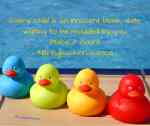“Where are your manners?” said the mother of a young boy coming out of the supermarket. This is a question on all our lips as parents, when it comes to the behaviour of the young children today. It appears as if manners like, politeness, respect, kindness and consideration have been thrown out of the window.

Raising polite children starts from exhibiting the correct manners, unfortunately with all the incivility around today, it is evident that the society is clearly quite manner less. Today it is right in our faces and almost difficult to avoid, everyone is constantly in a hurry, impatient, disrespectful, sloppy, rude, violent, generally impolite and offensive.
I often say that many things that are considered wrong under normal circumstances have become so habitual and are now accepted as the norm. The technology boom has not helped our children are fixed on their smart phones, ipads, tablets, video games and the social media craze. The result ultimately is that family and societal relationships have been marred. Some parents hardly see their children living in their own homes because they are stuck in their rooms being “technologically busy”. It has affected common dialogue at the dinner table, the real art of socialisation and rapport among family members. As a result unfortunately some children have become introverts and poor communicators. The ripple effect of this trait is that it is used to conceal acts of bullying or other adolescent challenges.
Can you believe that in the airport lounge one day while traveling out of the Country; I was seated next to a family of four – Mum, Dad and two children all with their individual gadgets from the iPad to smart phones in their hands. For the two hours we spent in the lounge, they did not say a word to each other until it was time to board the plane. Everybody was so engrossed in their own world. “Does this sound or look familiar”?
Being polite starts with cultivating an attitude of good manners, having respect, kindness and consideration for others. Manners themselves are a way of life, when you act in a way that is considered acceptable behaviour. To have manners is to respect yourself and others around you.
But what is the missing link?
The famous word “Etiquette” is what really is missing. Knowing aspects of etiquette will teach you the “how” of having manners. The good news is that there are etiquette strategies , guidelines to help you conduct yourself in the appropriate manner.
People must act in an acceptable manner so that others can co-exist around them. There is a school of thought that feels that etiquette is a pretentious way to behave and that it is fluffy, out dated, old fashioned and for the rich and famous. This is indeed a myth, because “Today’s Etiquette” is a very current, relevant, flexible, constantly evolving, culturally influenced and for everyone.
Why is it important for us to raise polite children? Our young children, growing teenagers, aspiring young professionals are hopefully all on a trail to becoming successful individuals. On their journey to success they will need to exhibit exceptional traits that will make them stand out in the midst of the current fierce competition.
They will need to have that “Panache Advantage” that sets them apart. Technical excellence is no more the answer to this question, it is all about the leadership skills, team spirit, personal charisma and effective communication style they bring to the table that will ultimately impact the bottom line in any organisation.
So is your child on the right track? what are soft skills really? “Soft Skills” is the new hard skills of today.
“Manners they say can open more doors than the best education can”
Having an excellent sense of etiquette will drive your sense of manners and politeness; you will be able to:
- Show that you value others
- Demonstrate your high level of integrity
- Express your sense of respect for others
- Make others feel comfortable around you
Having manners, being consciously polite without undermining your integrity is increasingly becoming a must do for both our children as well as we adults today. All adults who have a huge influence on children as a parent, teacher, counsellor, public figure, spiritual parent and the likes must invest in developing themselves to lead by good example because all children learn first and foremost by what they see and hear physically, the impact is great.
Unfortunately, it is not by accident that men that have been known to be wife beaters, when interviewed deeply will express how they saw their fathers doing the same and looked at it as a norm or a normal way of life. The consequences of bad behaviour in the world can have various forms such as people who are affected emotionally, loss of self-esteem and confidence and even leads to reduced productivity. Anyone in this mode will have a negative influence on the children around them, who then pick these traits in their developing years. When not checked, the children are moulded to exhibit negativity instead of positivity and the cycle begins again.
The greatest thing I see today is that there is a growing conscious awareness that incivility is prevalent. The onus is on us to fix this problem so that our children will become polished, have panache and stand out with a presence.
Contributed by Janet Adetu, JSK Etiquette & Image Training | @JSKEtiquette




